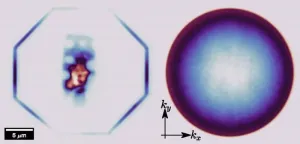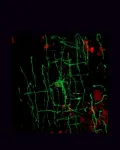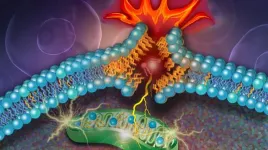(Press-News.org) The Damon Runyon Cancer Research Foundation has announced eight recipients of the 2024 Damon Runyon-Rachleff Innovation Award, established to support “high-risk, high-reward” ideas with the potential to significantly impact the prevention, diagnosis, or treatment of cancer. Five extraordinary early-career researchers will receive initial grants of $400,000 over two years, and each will have the opportunity to receive two additional years of funding (for a potential total of $800,000). This year, this “Stage 2” continuation support was granted to three current Innovators who demonstrated significant progress on their proposed research during the first two years of the award.
The Innovation Award is designed to provide funding to exceptionally creative thinkers with a revolutionary idea who lack sufficient preliminary data to obtain traditional funding. The awardees are selected through a highly competitive and rigorous process by a scientific committee comprised of leading cancer researchers with their own history of innovative work.
Previous Damon Runyon-Rachleff Innovators have pioneered the development of CAR T-cell therapies, revolutionized the biomedical sciences with CRISPR gene editing tools and single-cell sequencing methods, and developed computational methods for analyzing large datasets that continue to yield lifesaving discoveries.
This program was established thanks to the generosity of Andy and Debbie Rachleff.
New 2024 Damon Runyon-Rachleff Innovators
Alex M. Jaeger, PhD, H. Lee Moffitt Cancer Center & Research Institute
William Raveis Charitable Fund Innovator
“Engineering approaches to exploit MHC-II antigen presentation in cancer”
Recent advances in genomic and proteomic technologies have ushered in a new era of antigen-specific immunotherapies, including cancer vaccines. Such therapies depend upon immune system recognition and processing of antigens—proteins or fragments of proteins displayed on the cancer cell surface. However, our understanding of the principles that govern antigen presentation across cell types throughout the tumor microenvironment (TME) remains limited. Dr. Jaeger’s research uses sophisticated mouse models to understand how cells present and process antigens in healthy lung tissue and the lung cancer TME. These studies will advance our understanding of how different patterns of antigen presentation activate different T cell pathways and identify opportunities to engineer next-generation immunotherapies. The fundamental insights gained from these studies will be broadly applicable to multiple cancer types.
Daniel J. Puleston, PhD, Icahn School of Medicine at Mount Sinai
“A new platform to study cancer biology and therapy in humans”
The exploration of human tumors in their native environment is challenging, precluding a deeper understanding of how cancer and important therapeutics work. Dr. Puleston is developing new ways to investigate human cancer by keeping tumor-bearing organs alive outside of the body, allowing for the experimental study of tumors within human tissues. Employing this approach to study hepatocellular carcinoma (HCC), one of the most lethal forms of liver cancer, Dr. Puleston will expose HCC-laden livers to immunotherapy drugs and metabolic tracers to reveal the metabolic landscape of HCC cancers and how tumor metabolism is shaped following drug treatment. Through the study of tumors and anti-cancer agents in situ, Dr. Puleston hopes to elucidate new pathways with therapeutic potential and novel strategies to optimize existing therapeutics.
Sydney M. Shaffer, MD, PhD, University of Pennsylvania
“Spatially resolved cellular competition in oncogenesis”
Normal tissues naturally weed out harmful cells to prevent cancer. But when cancer develops, this defense system breaks down, allowing the cancer to attack healthy cells for its own growth. The Shaffer lab is set to explore this process, called cell competition, in esophageal cancer. By employing precise tracking and advanced spatial analysis, Dr. Shaffer aims to reveal how cell competition contributes to cancer development and how it might be harnessed to prevent it. The goal of her research is to pioneer early intervention therapies to halt cancer in its tracks.
Humsa S. Venkatesh, PhD, Brigham and Women's Hospital
“Identifying and disrupting the bioelectric circuits driving brain cancer”
Brain cancers are one of the most common causes of cancer-related death and represent 120 molecularly distinct diseases. Despite advances in clarifying the genetic landscape of these cancers, they remain clinically intractable, underscoring the need to elucidate the complex factors contributing to their heterogeneity. As neuronal activity is known to govern the development of neural circuits and neuroplasticity, it is critical to consider these neural networks in the context of disease. Dr. Venkatesh will use classical and systems neuroscience approaches to determine how the nervous system contributes to brain cancer progression. A comprehensive understanding of malignant neural network interactions may lead to novel therapeutic interventions aimed at normalizing the tumor microenvironment.
Ziyang Zhang, PhD, University of California, Berkeley
“Small molecule activators of GTP hydrolysis for mutant Ras-driven cancer”
Cancer growth is often driven by the dysregulation of a class of proteins known as small GTPases. These proteins act as molecular “on/off” switches that regulate critical cellular processes such as cell division and movement. However, in cancer, these molecular switches often become stuck in the “on” state due to mutations that hamper GTP hydrolysis, the reaction that turns “off” the GTPase switch. One notable example is the family of GTPases encoded by Ras genes, which are mutated in 30% of all human cancers. Dr. Zhang’s research aims to design small molecules that inactivate these mutant GTPases by accelerating GTP hydrolysis. His research will provide a new therapeutic mechanism for the treatment of mutant Ras-driven cancer for which no direct therapies are yet available. The design principles may also apply to the modulation of other small GTPases whose overactivation underlies cancer progression.
2024 Stage 2 Damon Runyon-Rachleff Innovators
Nora Kory, PhD, Harvard T.H. Chan School of Public Health
“Targeting mitochondrial transporters in cancer”
Cancer cells rely on efficient uptake, conversion, and exchange of nutrients and vitamins to support their rapid growth and survival. The molecular transport channels that allow passage of nutrients between the different cellular compartments are critical for the survival of cancer cells and are thus promising as potential drug targets. However, drug discovery efforts are hampered by a lack of basic understanding of these channels' identities, functions, and regulation inside cancer cells. Dr. Kory's research aims to identify transporters central to cancer cell nutrient supply and detoxification pathways and determine their role in the emergence, survival, and aggressiveness of cancer. Her research is relevant to all cancers, but particularly pediatric, blood, and breast cancers.
Jamie B. Spangler, PhD, Johns Hopkins University
“Engineered multispecific antibody-drug conjugates as novel cancer immunotherapeutics”
Groundbreaking advances in immunotherapy have revolutionized the treatment of cancer. In particular, new antibody drugs that block immunosuppressive pathways have achieved remarkable success in reawakening the immune system to clear tumor cells, leading to lasting cures in patients whose cancers do not respond to any other therapies. Unfortunately, the majority of patients (>70%) do not respond to immunotherapy treatment. It is difficult to predict which patients will benefit, creating an urgent demand for novel immunotherapy drugs that act through alternative mechanisms. Dr. Spangler is working to develop a class of antibody therapeutics that target cancer-promoting pathways in a different way than all current immunotherapies, with the goal of drastically expanding the percentage of cancer patients who benefit from them.
Srinivas R. Viswanathan, MD, PhD, Dana-Farber Cancer Institute
“X marks the spot: exploring how X-chromosome alterations drive sex differences in cancer”
Epidemiologic studies have revealed that many cancer types display differences in incidence or outcomes between the sexes. In most cases, these differences are only partially explained by non-genetic factors such as hormonal differences, carcinogen exposure, lifestyle, and access to health care. Our understanding of how genetic factors contribute to differences in cancer incidence between the sexes remains incomplete. A fundamental genetic difference between the sexes is in chromosome composition. Relative to male somatic cells, female somatic cells have an extra X chromosome. Most genes on the second copy of chromosome X in females are inactivated via a process known as X-chromosome inactivation, which approximately equalizes the dosage of X-linked genes between males and females. Dr. Viswanathan's project tests the hypothesis that genetic alterations to the X chromosome in cancer may perturb this carefully regulated process and thereby contribute to differences in cancer incidence or pathogenic mechanisms between males and females.
***
Damon Runyon Cancer Research Foundation
To accelerate breakthroughs, the Damon Runyon Cancer Research Foundation provides today's best young scientists with funding to pursue innovative research. The Foundation has gained worldwide prominence in cancer research by identifying outstanding researchers and physician-scientists. Thirteen scientists supported by the Foundation have received the Nobel Prize, and others are heads of cancer centers and leaders of renowned research programs. Each of its award programs is extremely competitive, with less than 10% of applications funded. Since our founding in 1946, in partnership with donors across the nation, the Damon Runyon Cancer Research Foundation has invested nearly $450 million and funded nearly 4,000 scientists.
100% of all donations to the Foundation are used to support scientific research. Administrative and fundraising costs are paid with revenue from the Damon Runyon Broadway Tickets Service and our endowment.
For more information visit damonrunyon.org.
END
Damon Runyon Cancer Research Foundation awards $3.2 million to innovative early-career scientists
2024-02-15
ELSE PRESS RELEASES FROM THIS DATE:
Scientific report reveals livestock as the key factor in cheatgrass spread
2024-02-15
For Immediate Release
Contact: Erik Molvar, Western Watersheds Project, 307-399-7910
Roger Rosentreter, Bureau of Land Management, Botanist (Retired), 208-991-8815
Don Mansfield, Emeritus Professor of Biology, College of Idaho, 208-871-8170
Scientific Report Reveals Livestock Grazing as the Key Factor in Cheatgrass Spread
HAILEY, Ida. (February 15, 2024) – A scientific report released today illuminates the causes of cheatgrass spread and compares the effectiveness ...
NRL discovers two-dimensional waveguides
2024-02-15
WASHINGTON – The U.S. Naval Research Laboratory (NRL), in collaboration with Kansas State University, announce the discovery of slab waveguides based on the two-dimensional material hexagonal boron nitride. This milestone has been reported in the journal Advanced Materials.
Two-dimensional (2D) materials are a class of materials which can be reduced to the monolayer limit by mechanically peeling the layers apart. The weak interlayer attractions, or van der Waals attraction, allows the layers to be separated via the so-called ...
AIBS names 2024 emerging public policy leaders
2024-02-15
The American Institute of Biological Sciences (AIBS) is pleased to announce that Alex Rich and Efraín Rodríguez-Ocasio have been selected to receive the 2024 AIBS Emerging Public Policy Leadership Award (EPPLA). The award recognizes graduate students in the biological sciences who have demonstrated leadership skills and an aptitude for working at the intersection of science and public policy.
Alex Rich is a Ph.D. student in neuroscience at Yale University in New Haven, Connecticut. Her research focuses on decision-making and disordered ...
Shuffling the deck for privacy
2024-02-15
By integrating an ensemble of privacy-preserving algorithms, a KAUST research team has developed a machine-learning approach that addresses a significant challenge in medical research: How to use the power of artificial intelligence (AI) to accelerate discovery from genomic data while protecting the privacy of individuals.[1]
“Omics data usually contains a lot of private information, such as gene expression and cell composition, which could often be related to a person’s disease or health status,” says KAUST’s Xin Gao. “AI models trained on this data – particularly deep learning models – have the potential to retain private ...
Root microbes may be the secret to a better tasting cup of tea
2024-02-15
You’d think the complex flavor in a quality cup of tea would depend mainly on the tea varieties used to make it. But a study appearing in the journal Current Biology on February 15 shows that the making of a delicious cup of tea depends on another key ingredient: the collection of microbes found on tea roots. By altering that assemblage, the authors showed that they could make good-quality tea even better.
“Significant disparities in microbial communities, particularly nitrogen metabolism-related microorganisms, were identified in the roots of tea plants with varying qualities through ...
Winners of 4th annual Rising Black Scientists Awards announced
2024-02-15
Cell Press, Cell Signaling Technology (CST), and the Elsevier Foundation are proud to announce the winners of the 4th annual Rising Black Scientists Awards: Jaye Wilson of Yale University, Kevin Brown Jr. of California State University San Marcos, Senegal Mabry of Cornell University, and Akorfa Dagadu of the Massachusetts Institute of Technology.
This year had the greatest number of submissions thus far, with the winners being selected from a pool of more than 350 applicants from across the life, health, physical, earth, environmental, and data sciences. Essays from the winners and honorees appear in the journals Cell and ...
Ancient retroviruses played a key role in the evolution of vertebrate brains
2024-02-15
Researchers report February 15 in the journal Cell that ancient viruses may be to thank for myelin—and, by extension, our large, complex brains. The team found that a retrovirus-derived genetic element or “retrotransposon” is essential for myelin production in mammals, amphibians, and fish. The gene sequence, which they dubbed “RetroMyelin,” is likely a result of ancient viral infection, and comparisons of RetroMyelin in mammals, amphibians, and fish suggest that retroviral infection and genome-invasion ...
Researchers discover that a rare fat molecule helps drive cell death
2024-02-15
Columbia researchers have found that a rare type of lipid is a key driver of ferroptosis, a form of cell death discovered by Columbia professor Brent Stockwell.
The findings provide new detail on how cells die during ferroptosis and could improve understanding of how to stop ferroptosis in contexts where it is harmfully occurring– in neurodegenerative diseases, for example– or induce it in contexts where it could be useful, such as using it to kill dangerous cancer cells.
The new research found that a rare type of ...
Plant disease: Mapping the spread of potato blight prior to the Irish potato famine *IMAGES*
2024-02-15
The first accurate maps of outbreaks of potato blight — a disease caused by the fungus-like pathogen Phytophthora infestans that was responsible for the Irish potato famine between 1845 and 1852 — in the USA between 1843 and 1845 are presented in a study published in Scientific Reports. The findings improve our understanding of the spread of potato blight before the disease reached Europe.
Jean Ristaino and colleagues mapped outbreaks of potato blight in North America between 1843 and 1845 by analysing historic agricultural reports published in the USA during this period. The authors found that the disease was first reported ...
New treatment for a rare and aggressive cancer improves survival rates in breakthrough clinical trial
2024-02-15
An innovative treatment significantly increases the survival of people with malignant mesothelioma, a rare but rapidly fatal type of cancer with few effective treatment options, according to results from a clinical trial led by Queen Mary University of London.
The phase 3 clinical trial, led by Professor Peter Szlosarek at Queen Mary and sponsored by Polaris Pharmaceuticals, has unveiled a breakthrough in the treatment of malignant pleural mesothelioma (MPM), a rare and often rapidly fatal form ...





